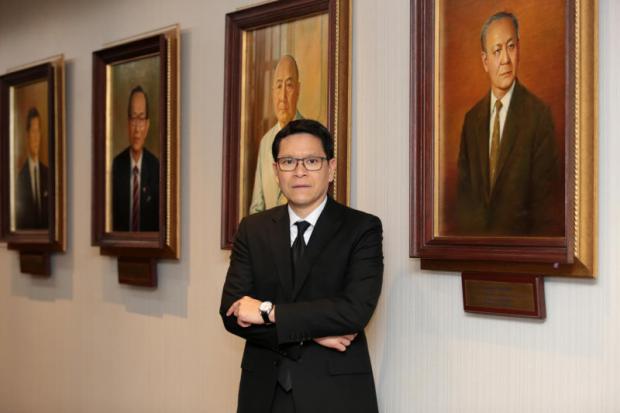
William McChesney Martin Jr, who was chairman of the Federal Reserve for 19 years, famously quipped that his job was to take away the punch bowl just when the party got going. Those words have come to embody the work of a central banker, who at times must implement unpopular measures for the sake of the greater good.
For the Bank of Thailand and other monetary authorities around the world, their decisions have wide-ranging effects on both the economy and society. The pressures and expectations of those leading such institutions are thus exceptionally high. Given that all politicians are pro-growth, central banks are often under pressure to maintain independence.

Bank of Thailand governor Veerathai Santiprabhob is captured in photo. In courtesy of BoT's PR.
Even though Veerathai Santiprabhob was chosen for the central bank's top job by the Prayut Chan-o-cha government, it doesn't mean that his work is absolutely free from political pressure. Last September, the Finance Ministry urged the Monetary Policy Committee (MPC) to trim the benchmark interest rate in order to stimulate the economy and keep a lid on inflation. But the MPC, chaired by Mr Veerathai, decided to put financial stability on the front burner. The MPC therefore stood pat at that month's meeting, repeatedly saying that the rate was already accommodative to the ongoing economic pickup.
"Our job is to go and tell someone that this [demand] is too much and it might cause problems in the long term, please stop," Mr Veerathai says. "Most times, [that decision] will affect someone's short-term gains."
The central bank deals with a lot of stakeholders, he says, so the important thing is to make the correct decisions for the public and do the right thing long-term, as that is pivotal to ensuring economic and financial stability.
Mr Veerathai's daily routine of meditation and prayer helps the governor shake out the stress of bearing so many responsibilities while clashing with different groups and interests. The practice also helps keep him centred when setting a course of action each day.
"To make an important decision that will affect a lot of people in a limited time, the mind of the decision maker has to be clear and sharp," Mr Veerathai says.
In his view it's necessary, especially for executives handling public policy, to have a good immune system and keep the mind and body in harmony.
The 48-year-old, who has a doctorate in economics from Harvard University, took the helm at the Bank of Thailand in October 2015. Being just 45 at the time, Mr Veerathai was among the youngest governors. But with extensive experience in international agencies, the public and private sectors, and the academic community, he was widely embraced for the top job at the central bank.
At a young age, Mr Veerathai's interest in sociology and history led him on a path to becoming an economist.
"In high school," he says, "I studied science and mathematics like most students who get better grades, but I really didn't like physics and chemistry, as I felt they were too abstract for me. Instead, I really had a strong interest in sociology, history and political science, as I really wanted to understand what's going on in society."
He says economics is a discipline that incorporates math and logic to explain the forces behind major political and historical shifts -- and more importantly, people's lives.
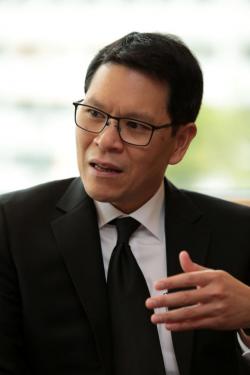
Mr Veerathai's interest in sociology and history led him on a path to becoming an economist.
Before heading to the US, Mr Veerathai studied at Thammasat University's Faculty of Economics, graduating with first-class honours. He went on to work at the Thailand Development Research Institute for nearly a year.
Mr Veerathai then won an Anandamahidol Foundation scholarship to pursue postgraduate studies at Harvard University, where he earned a master's degree and PhD in economics.
"Studying at Harvard not only taught me to have a deeper knowledge of economics, but also instilled in me the discipline to work hard, as the competition was very stiff," he says.
After graduation, Mr Veerathai joined the International Monetary Fund (IMF) as an economist for the Monetary and Exchange Affairs Department -- a career that allowed him to conduct in-depth analyses and offer policy recommendations to many countries.
"Working at the IMF is like working in a lab where you can see how policies turn out in different countries and environments, while the department required an action-oriented approach, which I prefer," he says.
After the Asian financial crisis in 1997, the Finance Ministry reached out to Mr Veerathai, who left the IMF to take a position as co-director of the Policy Research Institute at the Fiscal Policy Office.
During those two years at the Finance Ministry's think tank, he handled supervisory policy and economic stimulus measures, while also taking part in negotiations to secure loans from international organisations and credit rating agencies.
"Looking back, it was a very challenging time and one of the most important periods of my life," he says. "I learned a lot of lessons that are very helpful even now."
Believing that he still lacked experience in the private sector, Mr Veerathai joined Siam Commercial Bank, where he ended his tenure as executive vice-president and head of strategic planning.
He later joined the Stock Exchange of Thailand as executive vice-president and chief strategy officer before taking a break to work at foundations and sit on the boards of several listed companies.
He was asked by his predecessor, Prasarn Trairatvorakul, to serve on the seven-member MPC, then he applied for the position of governor when Mr Prasarn's term ended.
"If I hadn't taken a break from full-time work, I wouldn't have been able to serve in these positions at the Bank of Thailand, especially as governor, due to conflicts of interest," Mr Veerathai says.
"Mine is a life that was not planned. It's kind of been my life philosophy that I did my best at whatever commitment was at hand, and after that was done another opportunity would present itself. I evaluated [those opportunities] and chose the best one for me at the time to fulfil myself."
He says the Bank of Thailand has faced different challenges in each era, depending on the economic and political conditions.
Now the central bank has to be visionary as the world enters a period that is volatile, uncertain, complex and ambiguous, which can cause conventional policies to not yield the expected results, Mr Veerathai says.
The world is undergoing structural changes, especially in terms of technology, that will not only disrupt the financial sector, but other businesses.
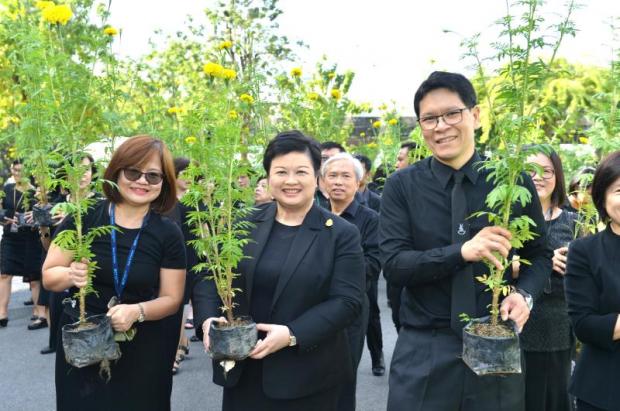
Mr Veerathai and the central bank's senior officials planted marigolds to show respect for the late King Bhumibol Adulyadej.
Thailand's challenges include the ageing society, high household debt, shifts in the world economic order and the trend of developed countries taking a more inward-looking approach.
"These changes require the central bank to be more visionary, to be able to see problems in the long term while also understanding changes in the global context, including economic and financial integration between Thailand and the rest of the world," Mr Veerathai says.
As the world grows more complex, some tools that might not normally be used by the central bank can be useful, such as data analytics or big data, which will help detect problems faster and in greater detail.
Mr Veerathai says that as major risks are likely to come more from outside the country and technology is blurring national lines, it's important for the central bank to work with other countries to help build a financial safety net, while also cooperating on supervising financial institutions.
The central banker's remarks also have a great impact on the market and can be interpreted as signals for the agency's policy direction, making the governor think carefully before speaking.
"It's not like when I was a free agent, when I might have looked at only one aspect of a problem," he says. "But in this position, there are many aspects that I have to be more mindful about.
"In every position or job, there are different limitations, statuses, opportunities and also the power to do what's good. If we have already committed to doing something, we have to make the best out of it."
Asked about the secrets to his success, Mr Veerathai says the first is to work hard and commit to what you're doing.
He says his discipline was built throughout his life, from the halls of universities to the IMF.
The second secret is to do what you love, as that will give you greater impetus to succeed.
The last is diversity in experiences, as it helps a person better understand what's going on in the economy and glean insights into each stakeholder's position.
"To be able to drive something forward, you have to set the right incentives and also help people understand each other," Mr Veerathai says. "One of the biggest problems in Thailand is coordination failures that occur when people don't understand each other."
He says many problems in the country are an issue of something being "lost in translation", so having experience in different fields helps one better understand different people and aspects of society, driving progress forward.
"An economist's job is to create a world with win-win situations, not a zero-sum game," he says. "If we can solve the coordination failure issue, we might be able to do that.
"The most important basic principle for management is teamwork, and how to know and understand one's own team and make them work well together. The head of an agency is like the conductor of an orchestra. We aren't leaders, but we're the ones who make those talented individuals in each role excel and be able to play the same musical score."
Mr Veerathai says it's vital to build a spirit of teamwork, know every player on the team, put them in the right position and make them cooperate with one another. This method will strengthen any organisation, regardless of size.
When it comes to role models, Mr Veerathai says he has different ones for different aspects of his life.
Perhaps the most influential was his own father, Pratin Santiprabhob, a former police chief and senator, who taught his son how to maintain his principles and integrity, especially in hard times.
Mr Veerathai also cites a handful of religious leaders who have been role models. Perhaps the most important is the Dalai Lama, who, despite conflicts, has kept a sense of mercy, reflecting a strong mind that is immune to the vagaries of life.
"Last but not least, [the late] King Bhumibol Adulyadej, who worked hard to help others. He is the best role model for people in this generation to do good for society. Whenever I felt tired and saw news about the King, it gave me the power to keep on doing what I thought was right."
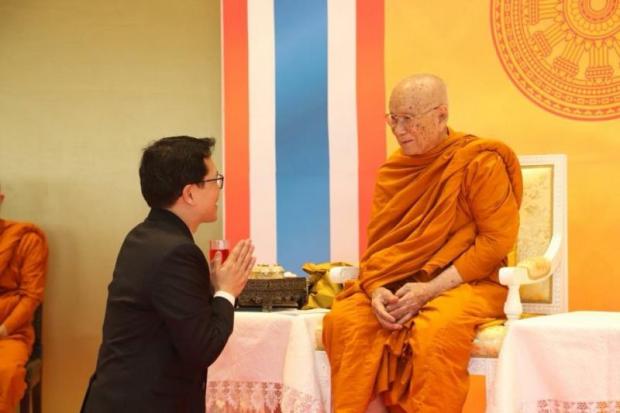
Mr Veerathai pays respect to Supreme Patriarch Somdet Phra Ariyavongsagatanana. In courtesy of BOT PR.
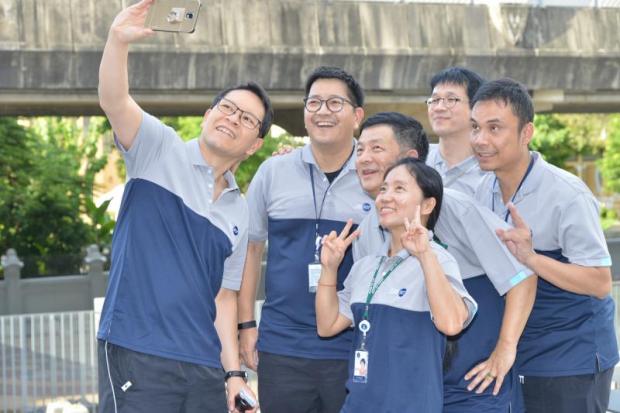
Mr Veerathai takes a selfie with central bank's staffs.